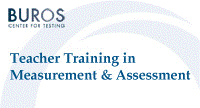Buros-Nebraska Series on Measurement and Testing

Teacher Training in Measurement and Assessment Skills
Date of this Version
1993
Document Type
Article
Citation
Published in Teacher Training in Measurement and Assessment Skills, edited by Steven L. Wise (Lincoln, NE: Buros Institute of Mental Measurements, University of Nebraska–Lincoln, 1993).
Abstract
The Buros-Nebraska Symposia on Measurement and Testing were developed to provide a forum for discussion of issues relevant to effective use of tests and measurement. The topic of the 1989 symposium was "Are Our School Teachers Adequately Trained in Measurement and Assessment Skills?" This topic was selected because of a growing interest in the knowledge and skill levels of teachers in measurement and assessment. There has been considerable debate regarding the amount and types of skills needed for effective evaluation of student achievement.
This volume, like previous ones in this series, reflects many of the papers presented at the symposium as well as additional invited chapters that complement the chapters based on the symposium presentations. An attempt was made to broadly address, from a variety of perspectives, the measurement issues encountered by teachers.
The first chapter in the volume is authored by Arlen Gullickson and is titled "Matching Measurement Instruction to Classroom-Based Evaluation: Perceived Discrepancies, Needs, and Challenges." Dr. Gullickson discusses previous research on the measurement training of teachers and provides a number of recommendations for improving the ways in which teachers are trained.
Richard Stiggins is the author of the second chapter, "Teacher Training in Assessment: Overcoming the Neglect." He asserts that there is a mismatch between what teachers need to know about assessment and what they are taught in teacher education programs. Dr. Stiggins makes recommendations for eliminating this mismatch.
"The Development of Standards for Teacher Competence in Educational Assessment of Students" is the title of the next chapter authored by James Sanders and Suzanne Vogel. They discuss the chronology of the Standards, beginning with the growing concern regarding the quality of student assessments and their use by educators and resulting in the Standards, which are included in the chapter.
James Terwilliger's chapter, "Some thoughts on Grading Systems and Practices," addresses the role of student grades in the assessment process. Dr. Terwilliger examines this issue from philosophical, theoretical, and empirical standpoints.
An alternative perspective on assessment issues in schools is provided in Donna Campbell's chapter, "Teachers' Assessment of Students: Roles, Responsibilities, and Purpose." She discusses the philosophical underpinnings of current assessment beliefs and practices, and suggests a thoughtful reconceptualization of the role and meaning of assessment.
In the next chapter, "Teacher's Testing Knowledge, Skills, and Practices," Ronald Marso and Fred Pigge provide a review of the measurement literature on teachers' testing knowledge and skills. Drs. Marso and Pigge also make a number of suggestions regarding how the measurement profession can improve current training strategies.
In "Measurement Training in Nebraska Teacher Education Programs," Steven Wise and Leslie Lukin present the results of a study investigating the measurement training provided by one state's teacher education programs. In addition, they report the findings of a survey of state teachers regarding their beliefs and attitudes about the adequacy of their measurement training.
In the final chapter, "Thoughts on the Relationship Between Measurement Knowledge and Teacher Effectiveness," Jack Kramer reviews the other papers in this volume and provides an additional perspective. Dr. Kramer asserts that a greater understanding is needed of how teachers actually measure behavior in the classroom, and how specific measurement practices influence student achievement.
Teaching requires a complex set of measurement and assessment skills. These skills include the administration and interpretation of standardized tests, the ability to make rapid in-classroom assessment of student understanding and progress, the measurement of student achievement, assignment of grades, and the ability to explain assessment results to parents. Moreover, the diversity of skills needed appears to be increasing. It is hoped that this volume will contribute to a greater understanding of the needed skills and how best to prepare teachers for a life of assessment in the classroom.


Comments
Copyright © 1993 by Buros Institute of Mental Measurements. Digital edition copyright © 2012 Buros Center for Testing. This book may be downloaded, saved, and printed by an individual for their own use. No part of this book may be re-published, re-posted, or redistributed without written permission of the holder of copyright.